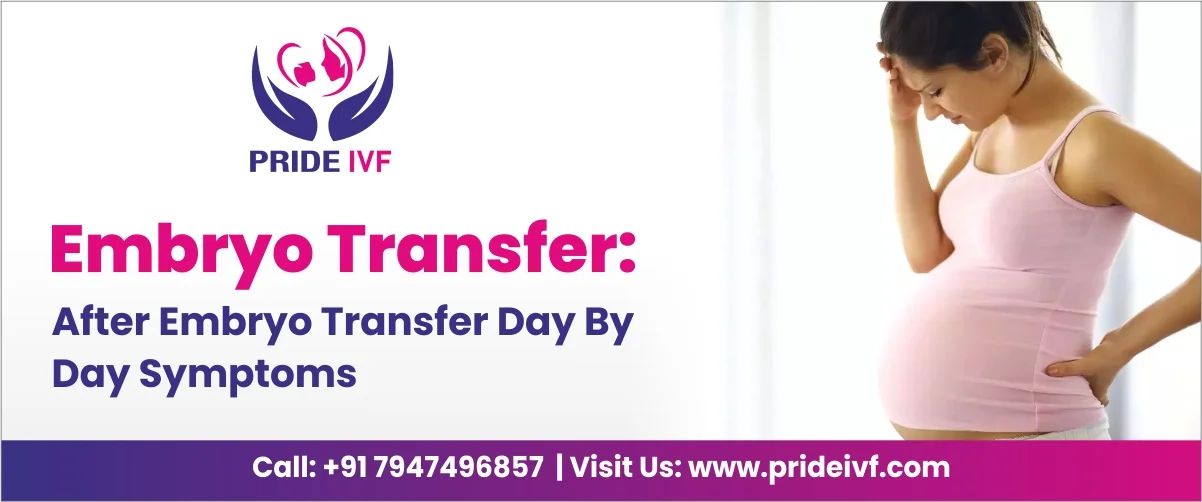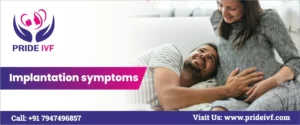Are you anxious to know what happens after embryo transfer into the uterus? Embryo transfer is the last step of the IVF process and is performed to place the embryo in the uterus, where its development will occur. Embryo transfer is one of the critical and the last steps after the fertilisation of gametes in the laboratory environment of the IVF clinic.
There is a need for IVF and embryo transfer when natural fertilisation is impossible. People choose this option for many reasons, like genetic disorders, blocked fallopian tubes, ovulation disorders, endometriosis, premature ovarian failure, and impaired sperm production. It is best to consult the IVF specialist (how to prepare for ivf consultation) before you decide to know all details about the IVF process step by step, all about after embryo transfer day by day symptoms, or all details about IVF injections and aftercare to manage the condition well.




What is an embryo transfer?
Embryo transfer is the last step of the IVF procedure. It starts when the woman is given fertility medications and ends when the embryo is transferred to her uterus. However, many couples fail to ask all about what happens after it, positive signs after embryo transfer and negative signs after embryo transfer.
They need to understand that after the embryo is transferred, one more struggle exists to overcome the final hurdle. With the help of IVF injection, specialists improve the quality and quantity of eggs by retrieving the best-quality eggs and sperm. Fertilisation of eggs and sperm is done in the lab, and after that, embryo transfer is done. After that, you have to wait for about two weeks to check if the IVF procedure has been successful by using a pregnancy test.
What happens after embryo transfer?
For couples, the days between embryo transfer and pregnancy test are very long, and they wish to conceive through IVF. Taking some crucial steps and precautions can help you to increase your chances of a successful embryo transfer. IVF specialists will advise you to eat a healthy diet fully packed with antioxidant-rich whole foods, healthy fats, and whole grains that help boost fertility. For more details go through: after embryo transfer diet chart.
You should maintain a healthy body weight and take properly prescribed supplements that help boost fertility. Following and maintaining a healthy lifestyle, reducing stress levels and staying hydrated is best when trying to conceive.
After Embryo Transfer Day By Day Symptoms, How Body Changes
After completion of the embryo transfer procedure, it will take a maximum of 14 days to detect pregnancy (Also Read: How Is IVF Pregnancy Different From Natural Pregnancy?), and these 14 days are considered the two-week wait during which patients are recommended not to test for pregnancy. Leu, we tell you in detail about day-to-day body changes after embryo transfer:
Day 1–3 after embryo transfer
During the first three days post-embryo transfer, the patient may experience some mild symptoms. During the first 24 to 72 hours, the fertilised egg divides and goes towards the uterus for implantation (implantation symptoms, Implantation bleeding). During this time, it will be an early stage of development; thus, no symptoms will be experienced after embryo transfer during this period. Some may experience symptoms comprising:
- Mild cramping as the embryo implants itself into the uterine lining
- Light Spotting or discharge because of irritation to the cervix during the transfer
- Fatigue because of the hormonal changes in the body.
- Mood swings because of the stress and anxiety of the IVF procedure.
It is vital to remember that every patient is different; some experience these symptoms, and some may not experience any symptoms after embryo transfer. If anybody experiences unusual symptoms, they may contact the IVF specialist immediately.
Also Read: When Does Implantation Occurs?
Day 4 to 6
During the first 4 to 6 days after embryo transfer, it develops and reaches the uterus. At this stage, the embryo will be implanted in the uterine lining, and the patient may experience noticeable symptoms because, at this stage, the body adjusts to changes caused by the embryo. Some common symptoms are:
- The cramming continues because the embryo implants further into the uterine lining.
- Breast tenderness may be experienced because of hormonal changes in the body.
- Increased urination because of an increase in the hormones in the body.
- Constipation because of hormonal changes again and also due to the use of progesterone supplements
It is vital to monitor your symptoms at this stage and consult your IVF specialist if you experience any unusual symptoms.
Day 7–9
During the first 7 to 9 days of embryo transfer, the embryo becomes more established in the uterine lining. At this stage, the embryo is implanted in the uterine lining, and the placenta starts forming some 7 days after embryo transfer symptoms.
- Bleeding can be caused by the embryo’s implantation into the uterine lining.
- Nausea, bloating, headaches, sore nipples are caused by hormonal changes in the body.
The above-listed are 8 days after embryo transfer symptoms that are common, but if you experience some unusual symptoms, it is best to talk to your doctor.
Lets get started
Days 10 to 12
During this phase, after embryo transfer, the developing speed will be fast, and the body will produce more hormones. If the IVF embryo transfer is successful, then the women will experience the following 10 days after embryo transfer symptoms:
- Increased hunger because of the increase in hormones in the body.
- Increased thirst because of increased hormones.
- Mild cramping because the uterus continuously stretches and grows to make space for a developing embryo.
- Mood swings occur because of emotional changes and stress during this stage.
- Fatigue because of hormonal changes and physical demands.
Also Read: 11 Days After Embryo Transfer Pregnancy Test, Pregnancy Symptoms After IVF
Day 13–14
This is near the end of the two-week wait period, and the embryo will continue to grow and develop as the body produces more hormones to support pregnancy. Some common symptoms are:
- Positive pregnancy test day, but discussing this with your doctor before doing this is necessary. After the test’s positive result, consult the expert for further care.
- Breast changes being caused by hormonal changes.
- Nausea and vomiting because of the early pregnancy stage
- Increased fatigue because of the physical demands of pregnancy and hormonal changes.
In a few cases, 13 days after embryo transfers, no symptoms are noticed; there is no need to worry, as about 10 to 15 percent of women don’t show post-transfer symptoms in the initial two weeks. So don’t feel worried if you are not experiencing symptoms. Your body will be in the physiological process post-successful embryo transfer treatment.
| Day | Symptoms |
|---|---|
| Day 1 To Day 2 | No specific symptoms |
| Day 3 To Day 4 | – Mild cramping |
| – Spotting | |
| Day 5 To Day 6 | – Cramping and bloating |
| – Spotting | |
| Day 7 To Day 8 | – Breast sensitivity |
| – Fatigue | |
| – Cramping and back pain | |
| Day 9 To Day 10 | – Increased breast tenderness |
| – Nausea | |
| – Increased urination | |
| Day 11 To Day 12 | – Darkened areolas |
| – Heightened sense of smell | |
| – Mood swings | |
| Day 13 To Day 14 | – Missed period |
| – Positive pregnancy test | |
| – Continued symptoms (breast tenderness, nausea, fatigue) |
Also Read: How Many Injections For IVF Treatment?
How can Pride IVF help you?
If you are seeking the best fertility clinic in Delhi, Pride IVF is the right option for you. The clinic is dedicated to offering compassionate IVF fertility care that meets your needs. Infertility treatment is provided for couples who were not able to conceive naturally.
The IVF specialists here are proud to offer fertility treatments to patients worldwide with the highest ivf success rates and affordable costs. Infertility treatment at Pride IVF is precise as well as success-oriented. Our state-of-the-art facility and highly experienced healthcare professionals offer exclusive treatment options for multiple infertility conditions.
Conclusion
Everybody wishes to become a parent and hold their children in their arms. But for some, the pathway towards parenthood is complex owing to the infertility issues that stop them from living their dream. In that case, they must consult an expert IVF specialist with experience and expertise for proper consultation.
Pride IVF is the best IVF centre in Delhi, serving as one of the safest women’s fertility centre, and specialises in IVF for male infertility as well. To fulfil your dream, a Well-Planned, Affordable, and Family-Oriented Schedule will help You Overcome Year-Long Issues With Infertility. Schedule your appointment to refine your results.




